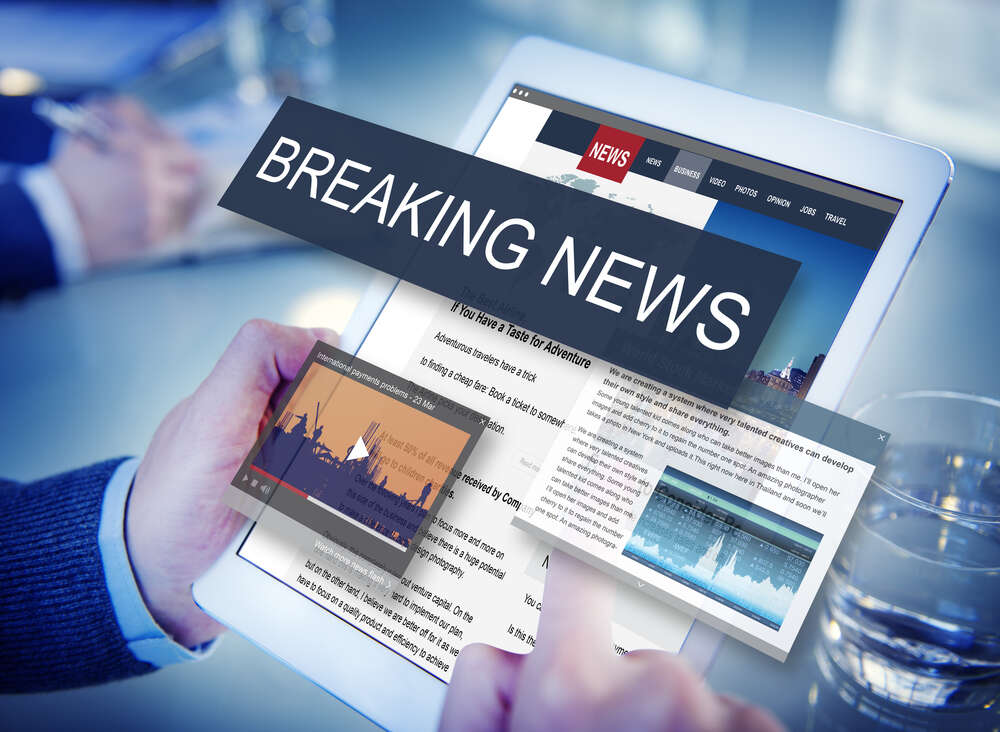The Relevance of Fact-Checking in the World of News Online
The frequency of misinformation in today's online news landscape has actually reached worrying degrees. Fact-checking companies play a necessary function in neutralizing this trend. They validate insurance claims and improve the reputation of journalism. The effectiveness of these companies typically hinges on their methods and public perception. As audiences navigate this intricate atmosphere, the ramifications of their searchings for may form the future of news intake and trust fund. What does this mean for the honesty of info progressing?

The Rise of Misinformation in the Digital Age
Exactly how has the introduction of digital modern technology contributed to the spread of false information? The fast growth of the web and social networks systems has actually promoted the dissemination of details at an extraordinary speed. Customers can share short articles, video clips, and point of views with a mere click, typically without verifying the content's precision. Algorithms focus on thrilling or mentally billed material, causing a spreading of deceptive narratives that record focus.
Additionally, the anonymity afforded by electronic platforms allows individuals to spread false details without accountability (stnews.live). False information flourishes in echo chambers, where users are subjected primarily to perspectives that strengthen their ideas, additionally setting falsehoods. The saturation of details can overwhelm individuals, making it testing to determine reliable sources from unreliable ones. As a result, false information has become a pervasive problem in the digital landscape, affecting popular opinion and count on genuine news sources
The Role of Fact-Checking Organizations
Fact-checking companies play a necessary duty in enhancing the credibility of journalism by verifying cases made in report. Their efforts are vital in combating false information, guaranteeing that exact information dominates in the digital landscape. By holding media electrical outlets responsible, these companies add substantially to educated public discussion.
Enhancing Credibility in Journalism
While misinformation multiplies in the electronic age, fact-checking organizations play an essential function in boosting the credibility of journalism. These companies diligently verify insurance claims made in news write-ups, public statements, and social media sites messages, guaranteeing that info shared to the public is accurate and credible. By giving independent assessments, they serve as an essential source for reporters, assisting them preserve high standards of honesty. In enhancement, their initiatives promote openness in media, cultivating public depend on. As target markets come to be progressively discerning, the presence of reputable fact-checking entities can distinguish reputable news sources from those that may spread out frauds. Ultimately, the dedication of fact-checking organizations to copyright reliability is essential for the health of democratic discussion.
Combating Misinformation Effectively
As misinformation remains to spread out swiftly throughout electronic platforms, the duty of fact-checking organizations becomes increasingly critical in the battle for precise details. These organizations act as guard dogs, looking at insurance claims made by somebodies and media electrical outlets to guarantee responsibility. By utilizing rigorous research approaches and expert evaluation, they verify truths and make clear misleading narratives. Their searchings for are disseminated through different networks, educating the public and fostering crucial thinking. In addition, collaborations with social media platforms boost their reach, permitting punctual flagging of incorrect information. As digital literacy expands, the impact of fact-checking companies is important in equipping audiences to determine fact from fraud, eventually adding to a much more educated society.
Exactly How Misinformation Affects Public Understanding
False information greatly threatens rely on media, leading target markets to question the integrity of news resources. Consequently, people typically move towards electrical outlets that strengthen their present ideas, adding to the polarization of viewpoints. This dynamic creates a fragmented info landscape, where shared recognizing becomes progressively tough to accomplish.
Rely on Media

Count on media has actually become increasingly fragile in the digital age, where the fast spread of false info can skew public perception. As false information proliferates throughout social media and online platforms, target markets usually discover it testing to recognize trustworthy sources from unstable ones. This unpredictability cultivates hesitation, leading many people to question the objectives behind news coverage. Trust fund in developed media electrical outlets has actually diminished, as consumers progressively turn to different sources that may lack strenuous editorial standards. This disintegration of depend on not only impacts individual ideas but additionally undermines the collective capability to engage in informed conversations. Inevitably, the honesty of journalism is at stake, highlighting the essential requirement for reliable fact-checking to restore self-confidence in the media landscape.

Polarization of Opinions
The enhancing apprehension toward typical media has added to a growing polarization of viewpoints among the public. False information, usually disseminated via social networks and on-line systems, plays a considerable function fit distinct ideological divides. People frequently look for information that straightens with their pre-existing ideas, strengthening their perspectives while rejecting opposing viewpoints. This resemble chamber impact increases divisions, leading to a fragmented public discussion where consensus ends up being progressively evasive. In addition, sensationalized narratives prosper in this setting, better click this site skewing public perception and cultivating mistrust in credible sources. As polarization rises, the need for efficient fact-checking comes to be extremely important to connect voids and advertise informed discussions, ultimately making certain a much more natural society capable of maneuvering complicated problems.
Methods for Effective Fact-Checking
Effective fact-checking depends on a methodical technique that includes extensive research study, confirmation of sources, and important evaluation of insurance claims. A fundamental strategy is cross-referencing information from multiple reliable sources to confirm its precision. Fact-checkers often make use of specialized data sources and archives to trace the origin of certain declarations, making certain that the reported information aligns with recorded evidence.
Another necessary method includes inspecting the context in which insurance claims are offered. Misleading info can develop from out-of-context quotations or discerning data usage. By taking a look at the broader narrative, fact-checkers can determine potential biases or false impressions.
Engaging with specialists in pertinent areas can provide clearness and insight that boosts the fact-checking procedure. This collaboration can reveal nuances that laypeople might ignore - stnews.live. Inevitably, a disciplined method combining these strategies fosters a much more informed public, boosting the dependability of info distributed in the digital age
The Effect of Social Network on News Intake
Just how has social networks transformed the way individuals eat see this page news? The appearance of systems like Facebook, Twitter, and Instagram has notably altered news consumption patterns. News is currently distributed swiftly, enabling users to gain access to real-time updates and involve with web content via likes, shares, and remarks. This immediacy has fostered a preference for bite-sized details, usually at the cost of comprehensive evaluation.
Additionally, social media sites makes it possible for individualized news feeds, where algorithms curate content based upon user choices, creating resemble chambers that might restrict exposure to diverse viewpoints. The role of typical news electrical outlets has actually reduced as individuals increasingly rely upon peer suggestions and trending topics. Consequently, the trustworthiness of information is usually endangered, as sensationalism can outweigh factual coverage. Generally, social media has reshaped news intake, stressing speed and customization while testing the standards of journalistic stability.
Equipping Audiences to Recognize Trusted Resources

In addition, taking a look at the authorship and organizational background of newspaper article can disclose prospective biases. Cross-referencing details across several credible electrical outlets better enhances the confirmation procedure. Making use of digital tools, such as internet browser expansions that rank the trustworthiness of internet sites, can likewise help in determining reliable info. By actively engaging with these resources and cultivating a crucial attitude, target markets can much better equip themselves to determine trustworthy news resources, eventually cultivating a much more educated culture in the middle of the intricacies of today's media environment.
The Future of Journalism and Fact-Checking
As the media landscape progresses, the future of journalism and fact-checking faces both challenges and possibilities. The increase of electronic platforms has actually equalized info dissemination, permitting diverse voices to arise. This has likewise led to the spreading of misinformation, requiring robust fact-checking devices. Journalists will significantly depend on technology, including AI devices, to confirm realities rapidly and efficiently.
Partnership between news companies and fact-checking entities is anticipated to enhance trustworthiness and openness. Audience interaction will play a crucial duty, as notified visitors come to be substantial partners in determining reliable material.
The need for accountability and accuracy is likely to expand, pushing reporters to copyright high criteria in their coverage. Eventually, the future of journalism may depend upon its ability to adapt to technological innovations while preserving journalistic integrity, making sure that fact-checking continues to be a cornerstone of reliable news.
Frequently Asked Inquiries
How Can I Report Misinformation I Encounter Online?
To report misinformation experienced online, individuals can make use of platform-specific coverage devices, offer clear proof, and share the info with fact-checking organizations. Involving with area discussions can also assist increase recognition about the misinformation.
What Are Usual Indications of False Information in News Articles?
Typical signs of misinformation in newspaper article consist of spectacular headings, lack of qualified sources, psychological language, irregular facts, and absence of author qualifications. Visitors should seriously evaluate material for these indications to recognize accuracy.
Just How Do Fact-Checkers Validate Resources?
Fact-checkers verify resources by cross-referencing information with credible databases, consulting experts, and taking a look at the original context of claims. They also examine the integrity of the resources, making certain exact and trustworthy info for public consumption.
What Lawsuits Can Be Taken Versus Misinformation?
Lawful activities against misinformation might consist of disparagement suits, cease-and-desist orders, and governing penalties. Victims can look for redress through civil courts, while some jurisdictions impose fines or permissions on systems sharing incorrect information.
Are There Apps for Fact-Checking News On-The-Go?
Countless applications exist for fact-checking news on-the-go, including Snopes, FactCheck.org, and PolitiFact. These applications assist users validate claims swiftly, advertising educated decision-making and cultivating an extra critical approach to consuming news in real-time.